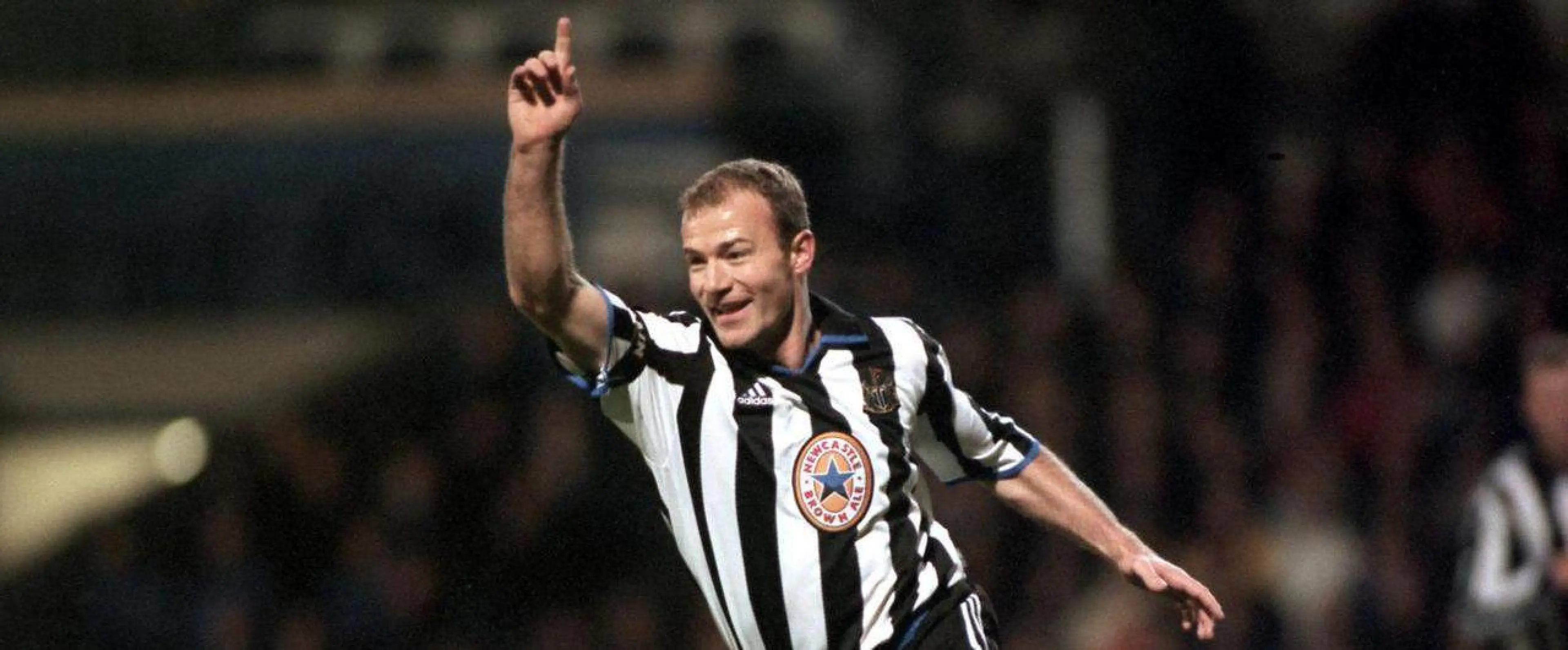Five other all-time club top scorers on Alan Shearer anniversary
Published:
Robbie Purves | February 4, 2016
On February 4th 2006, Alan Shearer set Newcastle’s goal scoring record with a strike against Portsmouth at St James’ Park.
Coral football ambassador Shearer finished his 201st Magpies goal, breaking Jackie Milburn’s record which had stood since 1957.
A freezing February afternoon, in front of 51,627 noisy Toon Army members, saw strikes from Shearer and Charles N’Zogbia with new caretaker boss Glenn Roeder prowling the touchline after taking over from sacked Graeme Souness.
Milburn, a boyhood Sunderland fan, moved to Linfield FC after a 13-year Magpies career – winning three FA Cups.
While playing for the Air Training Corps, Milburn’s pace and goalscoring caught the eye of Wilf Taylor, a director of Newcastle. Then 19 year-old Milburn was invited to Newcastle for a trial, and the rest as they say, is history.
After Shearer beat his father’s record, Milburn’s son, Jack, said: “To compare my dad and Shearer is like trying to predict whether Muhammad Ali would beat Mike Tyson.”
Shearer joined Newcastle for a then world record fee of £15m from Blackburn Rovers in 1996. Playing for his boyhood club, Shearer went on to score 148 league goals for Newcastle, retiring as the Premier League’s all-time leading goalscorer at 260.
Here, our football experts look at other club icons that are record scorers for their respective teams.
Ian Rush (Liverpool, 346)
Wales leading marksman Rush is also Anfield’s top dog, having joined from Chester City when he was 19 in 1980 for £300k- a record for a teenager at the time.
Rush started slow but would go on to terrorise defences, establishing himself as a legend for both club and country.
He formed one of the most formidable strike partnerships in football history on Merseyside with fellow Reds idol Kenny Dalglish. Using his pace, Rush would often be on the end of Dalglish’s passes and was deadly with both feet when dispatching them.
During his Liverpool career, Rush scored 346 goals, surpassing Roger Hunt’s (285) record that stood since 1969. He lifted five First Division trophies and two European Cups in a side that dominated 1980’s English and European football.
Frank Lampard (Chelsea, 211)
During his career at Chelsea, Lampard won every major trophy and amassed 429 domestic appearances. He moved from West Ham United to Stamford Bridge on June 11th 2001, for £11m.
By the end of his 13-year Blues career, he had scored 211 times. Now with MLS franchise New York City, Lampard possesses an eye for goal, with an unbelievable talent for arriving in the box at just the right time.
What makes his achievement so special is that he scored those goals from midfield and has remained prolific throughout his career.
The Bridge legend sits fourth on the all-time leading Premier League goalscoring leader board, two goals in front of Thierry Henry – who scored more goals in Europe.
When Lampard faced his former team Chelsea while playing for Manchester City, he scored coming off the bench. Jose Mourinho’s men were the 39th club he had scored against in the Premier League, a feat which has its place in Guinness Book of Records on September 10th 2015.
Theirry Henry (Arsenal, 228)
France national team all-time top scorer Henry is widely regarded as one of the greatest ever players to grace the Premier League and cemented his place in history by breaking Ian Wright’s Gunners record in 2005.
Playing as a striker during his youth, Henry spent his time at Monaco and Juventus operating on the flank. When he joined Arsenal in 1999, Arsene Wenger immediately switched Henry to his childhood position, often pairing him with Dutch veteran and creative maestro, Dennis Bergkamp.
Henry’s father, Antoine, said that his son picked up his deadly, calm shooting by watching his hero Marco Van Basten. He was also influenced by a new breed of 90’s finishers, such as George Weah and the legendary Brazilian, Ronaldo.
These players could operate with immense speed and skill, both inside and outside the box. Henry left in 2007 to Barcelona having won seven major trophies, including being a member of Arsenal’s Premier League winning ‘Invincibles’.
Jimmy Greaves (Tottenham, 266)
Greaves started his career at Chelsea in 1957 and scored 124 goals in just 157 appearances, before being sold to Italian giants AC Milan in 1961.
His spell in Italy was not a happy one and returned within a yearl however, he still boasted an impressive goal record. He joined Spurs in December 1961 for £99,999 where he would become a club legend.
A World Cup winner in 1966, Greaves cited his relaxed attitude as the reason for his assured composure and confidence on the pitch.
His fantastic positional skills and supreme pace allowed him to accumulate 266 goals in 379 games for Spurs – finally being inducted into the Tottenham Hotspur Hall of Fame in 2015.
Sir Bobby Charlton (Manchester United, 249)
Regarded as won of the games greatest players, Charlton played under the legendary leadership of Sir Matt Busby.
Establishing the ‘Holy Trinity’ of George Best, Denis Law and Charlton, who are still viewed as an attacking trio to match any in world football history, Busby took the Red Devils to dominate football.
During his 17-year United career, Charlton won nine major trophies including three First Division titles and a European Cup in 1968.
Pivotal in rebuilding United after the tragedy of the Munich Air Disaster, which saw the brightest young talent in world football perish, Sir Bobby remains an ever present at United, watching all of their home games from the stands and an influential figure on the Red Devils’ board.
Rooney sits five goals away from Charlton’s record on 244 goals and looks certain to break the World Cup winner’s record within the next few months. Superb odds of 7/1 say Rooney will break the deadlock against Chelsea on Sunday, February 7th.








